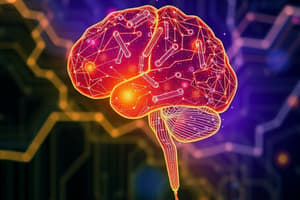Podcast
Questions and Answers
Which of the following processes transforms sensory data into a mental representation?
Which of the following processes transforms sensory data into a mental representation?
- Consolidation
- Retrieval
- Storage
- Encoding (correct)
What is the term for maintaining encoded information over a period?
What is the term for maintaining encoded information over a period?
- Storage (correct)
- Retrieval
- Rehearsal
- Encoding
Which memory stage has the shortest duration?
Which memory stage has the shortest duration?
- Short-term Memory
- Sensory Memory (correct)
- Working Memory
- Long-term Memory
What is the process of accessing and bringing stored information into conscious awareness?
What is the process of accessing and bringing stored information into conscious awareness?
What type of memory involves retrieving information without cues?
What type of memory involves retrieving information without cues?
What is visual sensory memory also known as?
What is visual sensory memory also known as?
Which type of long-term memory requires conscious recall?
Which type of long-term memory requires conscious recall?
What brain region is crucial for forming explicit long-term memories?
What brain region is crucial for forming explicit long-term memories?
Which brain region is involved in emotional memories?
Which brain region is involved in emotional memories?
What type of memory involves skills and habits?
What type of memory involves skills and habits?
What is the term for the loss of information from memory due to the passage of time?
What is the term for the loss of information from memory due to the passage of time?
What type of interference occurs when old information hinders the recall of new information?
What type of interference occurs when old information hinders the recall of new information?
Which memory enhancement strategy involves organizing information into manageable units or groups?
Which memory enhancement strategy involves organizing information into manageable units or groups?
What memory aid uses imagery or organizational techniques?
What memory aid uses imagery or organizational techniques?
Repeating information to maintain it in memory is known as what?
Repeating information to maintain it in memory is known as what?
What effect involves incorporating misleading information into one's memory of an event?
What effect involves incorporating misleading information into one's memory of an event?
What is it called when you attribute an event to the wrong source?
What is it called when you attribute an event to the wrong source?
What is the term for memories of events that never occurred?
What is the term for memories of events that never occurred?
During aging, which type of memory declines more?
During aging, which type of memory declines more?
Which of the following is a strategy to maintain cognitive function during aging?
Which of the following is a strategy to maintain cognitive function during aging?
Flashcards
What is memory?
What is memory?
The brain's ability to encode, store, and retrieve data or information.
What is encoding?
What is encoding?
Transforms sensory data into a mental representation for memory.
What is memory storage?
What is memory storage?
Maintaining encoded information over a time period.
What is memory retrieval?
What is memory retrieval?
Signup and view all the flashcards
What is sensory memory?
What is sensory memory?
Signup and view all the flashcards
What is iconic memory?
What is iconic memory?
Signup and view all the flashcards
What is echoic memory?
What is echoic memory?
Signup and view all the flashcards
What is semantic memory?
What is semantic memory?
Signup and view all the flashcards
What is episodic memory?
What is episodic memory?
Signup and view all the flashcards
What is procedural memory?
What is procedural memory?
Signup and view all the flashcards
What is the role of the hippocampus in memory?
What is the role of the hippocampus in memory?
Signup and view all the flashcards
What is decay in memory?
What is decay in memory?
Signup and view all the flashcards
What is proactive interference?
What is proactive interference?
Signup and view all the flashcards
What is retroactive interference?
What is retroactive interference?
Signup and view all the flashcards
What is amnesia?
What is amnesia?
Signup and view all the flashcards
What is anterograde amnesia?
What is anterograde amnesia?
Signup and view all the flashcards
What is retrograde amnesia?
What is retrograde amnesia?
Signup and view all the flashcards
What is chunking?
What is chunking?
Signup and view all the flashcards
What is elaborative rehearsal?
What is elaborative rehearsal?
Signup and view all the flashcards
What is the testing effect?
What is the testing effect?
Signup and view all the flashcards
Study Notes
- Memory is the faculty of the brain by which data or information is encoded, stored, and retrieved when needed
- It is vital to experiences and related to perception, intention, and consciousness
Memory Encoding
- Encoding is the process of transforming sensory data into a form of mental representation
- It involves the initial learning of information
- Encoding is crucial for creating a memory
- The form of encoding can impact later memory retrieval
Memory Storage
- Storage: maintaining encoded information over a period of time
- Sensory memory is very short (milliseconds to seconds)
- Short-term memory lasts seconds to minutes
- Long-term memory can last days to years
- Memory consolidation is the process of transferring information from short-term to long-term memory
Memory Retrieval
- Retrieval involves accessing and bringing stored information into conscious awareness
- Recall is retrieving information without cues
- Recognition involves identifying previously learned information when presented
- Retrieval failure includes instances when information is stored, but not accessible
Types of Memory
- Sensory memory: the initial stage that holds sensory information briefly
- Iconic memory: visual sensory memory
- Echoic memory: auditory sensory memory
- Short-term memory (STM): holds a small amount of information in mind in an active, readily available state for a short period of time
- Long-term memory (LTM): storing information for a long duration
- Explicit (declarative) memory: requires conscious recall
- Semantic memory: facts and general knowledge
- Episodic memory: personal experiences and events
- Implicit (non-declarative) memory: does not require conscious recall
- Procedural memory: skills and habits
- Emotional conditioning involves emotional responses through classical conditioning
Brain Regions Involved in Memory
- Hippocampus: crucial for forming explicit long-term memories
- Amygdala: involved in emotional memories
- Cerebellum: plays a role in procedural memories and motor learning
- Prefrontal cortex: involved in working memory and encoding/retrieval of information
Forgetting
- Forgetting is the failure to retrieve or access stored information
- Decay: loss of information due to the passage of time
- Interference: when similar information disrupts encoding or retrieval
- Proactive interference: old information interferes with new information
- Retroactive interference: new information interferes with old information
- Motivated forgetting: repression (unconscious) or suppression (conscious)
- Encoding failure: information never enters long-term memory
- Retrieval failure: inability to access stored information
- Tip-of-the-tongue phenomenon: knowing that you know something without being able to recall it
- Amnesia: memory loss due to brain injury or trauma
- Anterograde amnesia: inability to form new memories after the event
- Retrograde amnesia: loss of memories from before the event
Memory Enhancement Strategies
- Chunking: organizing information into manageable units
- Mnemonics: memory aids that use imagery or organization
- Method of loci: associating items with specific locations
- Acronyms: using first letters to form a word
- Rehearsal: repeating information to maintain it in memory
- Elaborative rehearsal: connecting new information to existing knowledge
- Distributed practice: spreading out study sessions
- Testing effect: enhanced memory after retrieving information
- Sleep: important for memory consolidation
Memory Distortions and Errors
- Memory is not always accurate and can be subject to distortions and errors
- Misinformation effect: incorporating misleading information into one's memory of an event
- Source amnesia: attributing an event to the wrong source
- False memories: memories of events that never occurred
- Suggestibility: memories can be influenced by suggestions and leading questions
- Bias: current beliefs and feelings can distort past memories
Memory and Aging
- Age-related changes in memory are common, but the extent varies
- Working memory declines with age
- Episodic memory declines more than semantic memory
- Processing speed slows down
- Strategies to maintain cognitive function as you age include physical exercise, mental stimulation, and social engagement
Studying That Suits You
Use AI to generate personalized quizzes and flashcards to suit your learning preferences.




